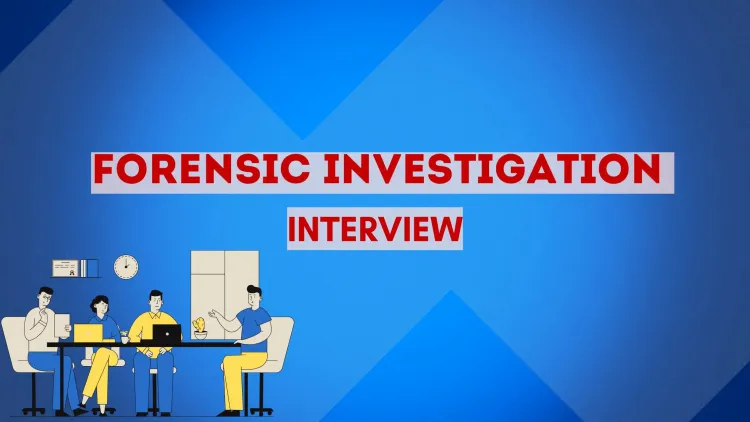How to Ace Your Forensic Investigation Job Interview | Essential Skills, Common Questions, and Interview Tips
Preparing for a forensic investigation job interview requires a strong grasp of technical skills, analytical thinking, and practical experience. This comprehensive guide outlines how to prepare for a forensic investigator interview, covering key aspects such as understanding the role, highlighting essential skills, educational background, certifications, and familiarity with tools like EnCase, FTK, Cellebrite, and Wireshark. The blog also delves into commonly asked interview questions and provides strategies for answering behavioral and situational questions using the STAR method. Additionally, it emphasizes the importance of mock interviews, resume building, and portfolio development. With tips on how to communicate your expertise and approach, this guide will help you stand out as a strong candidate in forensic investigation roles, ensuring you're well-prepared to succeed in your interview.

Table of Contents
- Introduction
- Understanding the Role of a Forensic Investigator
- Essential Skills to Highlight in an Interview
- Educational Background and Certifications
- Technical Knowledge and Tools to Master
- Common Forensic Investigation Interview Questions
- How to Answer Behavioral and Situational Questions
- Mock Interviews and Practice Techniques
- Building a Strong Resume and Portfolio
- Final Tips for Acing Your Forensic Investigation Interview
- Conclusion
- Frequently Asked Questions (FAQs)
Introduction
The field of forensic investigation is an exciting and challenging profession that plays a crucial role in solving crimes, analyzing evidence, and supporting the justice system. If you are preparing for a forensic investigation job interview, it is essential to be well-equipped with technical skills, analytical thinking, and problem-solving abilities. Employers seek professionals who can work under pressure, analyze data effectively, and handle digital and physical evidence efficiently.
This blog provides a step-by-step guide on how to prepare for forensic investigation interviews, including key skills, common questions, interview techniques, and practical tips to help you secure your dream job.
Understanding the Role of a Forensic Investigator
Before attending an interview, you must have a clear understanding of what forensic investigators do. A forensic investigator's primary role is to collect, analyze, and interpret evidence to assist law enforcement agencies, lawyers, and courts in solving criminal cases.
Key Responsibilities:
- Collecting and preserving physical and digital evidence.
- Conducting crime scene investigations and forensic analysis.
- Performing laboratory tests, including DNA analysis and toxicology tests.
- Analyzing digital evidence such as emails, computer files, and mobile phone data.
- Writing detailed forensic reports for legal proceedings.
- Testifying in court as an expert witness.
Understanding these responsibilities will help you tailor your answers to interview questions and showcase how your skills align with the job.
Essential Skills to Highlight in an Interview
To stand out in a forensic investigation job interview, emphasize your core forensic skills, which include:
1. Analytical Skills
- Ability to examine and interpret evidence accurately.
- Strong attention to detail for detecting crucial clues.
2. Technical Proficiency
- Experience with digital forensics tools like EnCase, FTK, Autopsy.
- Knowledge of DNA analysis, toxicology, and fingerprinting.
3. Communication Skills
- Ability to write clear and precise forensic reports.
- Strong verbal communication for courtroom testimony.
4. Problem-Solving Skills
- Critical thinking to piece together evidence and draw logical conclusions.
- Ability to work under pressure and make quick decisions.
5. Ethical Judgment
- Understanding of legal procedures and evidence handling.
- Strong commitment to maintaining integrity and confidentiality.
Educational Background and Certifications
To become a forensic investigator, a strong educational background is crucial.
Degree Requirements:
- Bachelor’s Degree in Forensic Science, Criminal Justice, Cybersecurity, or Biology.
- Master’s Degree (optional but beneficial for advanced roles).
Certifications That Boost Your Career:
- Certified Forensic Investigator (CFI)
- Certified Computer Examiner (CCE)
- Certified Ethical Hacker (CEH)
- GIAC Certified Forensic Analyst (GCFA)
- Certified Forensic Computer Examiner (CFCE)
Mentioning relevant degrees and certifications in your interview will demonstrate your commitment and expertise in the field.
Technical Knowledge and Tools to Master
Forensic investigation is technology-driven, so employers expect candidates to be familiar with essential forensic tools.
Common Forensic Tools to Learn:
- Digital Forensics: EnCase, Autopsy, FTK, Volatility.
- Mobile Forensics: Cellebrite, Oxygen Forensic Suite.
- Network Forensics: Wireshark, Snort, Splunk.
- Data Recovery: Recuva, TestDisk, X-Ways Forensics.
Having hands-on experience with these tools will make you a stronger candidate in the interview process.
Common Forensic Investigation Interview Questions
Here are some commonly asked questions in forensic investigation interviews:
- What inspired you to become a forensic investigator?
- How do you handle digital evidence in an investigation?
- Can you describe a challenging forensic case you worked on?
- How do you ensure the integrity of forensic evidence?
- What forensic tools are you proficient in?
- How do you handle high-pressure situations?
- What steps do you take to secure digital evidence?
- Can you explain chain of custody in forensic investigations?
- Have you ever testified in court? If so, what was your experience like?
- How do you stay updated with advancements in forensic science?
How to Answer Behavioral and Situational Questions
Employers often use behavioral and situational interview questions to assess your problem-solving skills.
Sample Question:
"Tell me about a time you had to analyze a large amount of evidence. How did you approach it?"
Answer Structure (STAR Method):
- Situation: Describe the scenario.
- Task: Explain your role.
- Action: Detail the steps you took.
- Result: Highlight the outcome.
Using this structured approach will make your answers concise, relevant, and impactful.
Mock Interviews and Practice Techniques
1. Conduct Mock Interviews
- Practice with a friend or mentor.
- Record your answers and analyze your responses.
2. Use Online Resources
- Explore interview simulations on platforms like Glassdoor, LinkedIn, and Indeed.
3. Improve Your Body Language
- Maintain eye contact and sit confidently.
- Speak clearly and professionally.
Building a Strong Resume and Portfolio
Your resume and portfolio should showcase your skills, experience, and certifications.
Resume Tips:
- Use clear formatting and bullet points.
- Highlight relevant skills and projects.
- Include forensic certifications.
Portfolio Content:
- Sample forensic reports.
- Case studies or digital forensic investigations.
- Code snippets (if applicable).
Final Tips for Acing Your Forensic Investigation Interview
- Research the Company: Understand their forensic division.
- Dress Professionally: A formal, neat appearance creates a good impression.
- Prepare Questions: Ask about team dynamics, career growth, and expectations.
- Be Honest: If you don’t know something, admit it but show willingness to learn.
- Follow Up: Send a thank-you email after the interview.
Conclusion
Preparing for a forensic investigation job interview requires a combination of technical knowledge, analytical thinking, and strong communication skills. Employers seek candidates who can handle evidence responsibly, solve complex cases, and adapt to evolving forensic technologies.
By focusing on essential skills, certifications, forensic tools, and common interview questions, you can enhance your chances of securing a job in this competitive field. Mock interviews, resume preparation, and continuous learning will further strengthen your confidence and interview performance.
Forensic investigation is a highly rewarding career that allows you to contribute to justice and public safety. With dedication and the right preparation, you can build a successful career in this exciting domain.If you're passionate about crime-solving, forensic science, and digital investigations, start preparing today and take the first step toward your dream job!
Frequently Asked Questions (FAQs)
1. How do I prepare for a forensic investigation job interview?
Research the company, practice forensic-related questions, review forensic tools, and prepare examples of past experiences using the STAR method (Situation, Task, Action, Result).
2. What are the most common forensic investigation interview questions?
Expect questions related to evidence handling, forensic tools, chain of custody, digital forensics, and legal procedures.
3. What degree do I need to become a forensic investigator?
A degree in Forensic Science, Criminal Justice, Cybersecurity, or Biology is typically required. A master's degree may be beneficial for advanced positions.
4. What certifications can help me get a forensic investigation job?
Certifications such as Certified Forensic Investigator (CFI), Certified Computer Examiner (CCE), and GIAC Certified Forensic Analyst (GCFA) can improve job prospects.
5. Do I need lab experience for forensic investigation jobs?
Yes, most forensic investigator roles require practical experience in evidence collection, analysis, and laboratory procedures.
6. What are the best forensic tools to learn?
Some essential tools include EnCase, FTK, Autopsy, Cellebrite, and Wireshark for digital and forensic analysis.
7. How important is the chain of custody in forensic investigations?
It is crucial to maintaining evidence integrity. A broken chain of custody can render evidence inadmissible in court.
8. What is the role of forensic investigators in court cases?
They may testify as expert witnesses, presenting forensic evidence to help the judge or jury understand the case.
9. Is forensic investigation a stressful career?
Yes, forensic investigators often face tight deadlines, high-pressure cases, and emotionally challenging crime scenes.
10. What soft skills are important for forensic investigators?
Communication, teamwork, attention to detail, ethical judgment, and critical thinking are essential for success.
11. What is the average salary of a forensic investigator?
Salaries vary based on experience and location, but forensic investigators typically earn between $50,000 and $90,000 annually.
12. Can forensic investigators work remotely?
Some aspects, such as digital forensics and cybersecurity investigations, can be performed remotely, but fieldwork often requires physical presence.
13. What types of forensic investigations exist?
Fields include digital forensics, DNA analysis, ballistics, forensic toxicology, and forensic psychology.
14. Do forensic investigators work with law enforcement agencies?
Yes, they frequently collaborate with police departments, the FBI, and other investigative agencies.
15. How do forensic investigators handle digital evidence?
They use specialized tools to extract, analyze, and preserve data while ensuring its integrity in court proceedings.
16. Can forensic investigators analyze social media data?
Yes, forensic investigators can use social media forensics to retrieve evidence from platforms like Facebook, Twitter, and Instagram.
17. How do forensic investigators recover deleted files?
They use forensic tools like Autopsy, FTK, and EnCase to recover deleted, encrypted, or hidden files.
18. What challenges do forensic investigators face?
Challenges include handling sensitive evidence, keeping up with evolving technology, maintaining objectivity, and testifying in court.
19. Is cybersecurity knowledge important for forensic investigators?
Yes, with the rise of cybercrime, digital forensics and cybersecurity skills are highly valuable in forensic investigations.
20. Do forensic investigators need a security clearance?
In some cases, forensic investigators working for government agencies or intelligence organizations may require security clearances.
21. What legal knowledge should forensic investigators have?
They must understand criminal law, evidence handling procedures, chain of custody rules, and courtroom protocols.
22. Are internships necessary to get a forensic investigator job?
Internships provide practical experience and significantly enhance job opportunities in forensic science.
23. What are some forensic subfields to specialize in?
Popular specializations include forensic accounting, forensic toxicology, forensic pathology, and digital forensics.
24. How can I gain hands-on experience in forensic investigation?
You can gain experience through internships, laboratory training, crime scene analysis, and participating in forensic competitions.
25. What forensic tools are used for mobile device analysis?
Cellebrite, Oxygen Forensic Suite, and XRY are widely used for mobile forensics.
26. How do forensic investigators examine firearms evidence?
They analyze bullet trajectories, gunpowder residue, and firearm serial numbers using ballistics software and microscopy.
27. How do forensic toxicologists analyze substances in crime cases?
They use gas chromatography, mass spectrometry, and immunoassays to detect poisons, drugs, and toxins.
28. What role does artificial intelligence play in forensic investigations?
AI assists in pattern recognition, facial recognition, and automated forensic data analysis, improving investigation speed and accuracy.
29. Can forensic investigators work in private firms?
Yes, many forensic investigators work in private forensic labs, cybersecurity firms, insurance companies, and consulting agencies.
30. What books or resources should I read to prepare for forensic interviews?
Books like “Forensic Science: An Introduction to Scientific and Investigative Techniques” by Stuart H. James and online courses in forensic science can be helpful.












![Top 10 Ethical Hackers in the World [2025]](https://www.webasha.com/blog/uploads/images/202408/image_100x75_66c2f983c207b.webp)

![[2025] Top 100+ VAPT Interview Questions and Answers](https://www.webasha.com/blog/uploads/images/image_100x75_6512b1e4b64f7.jpg)









